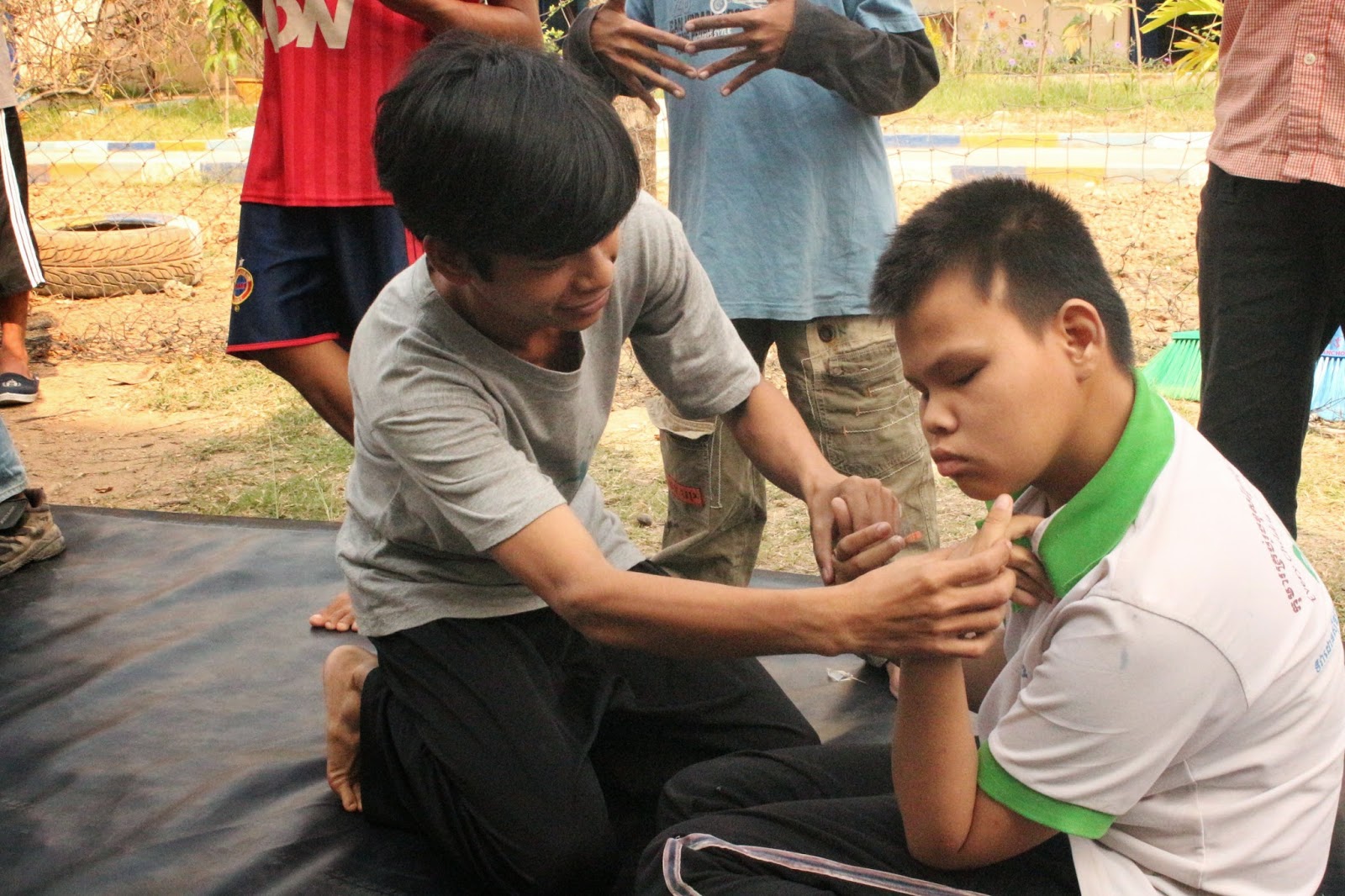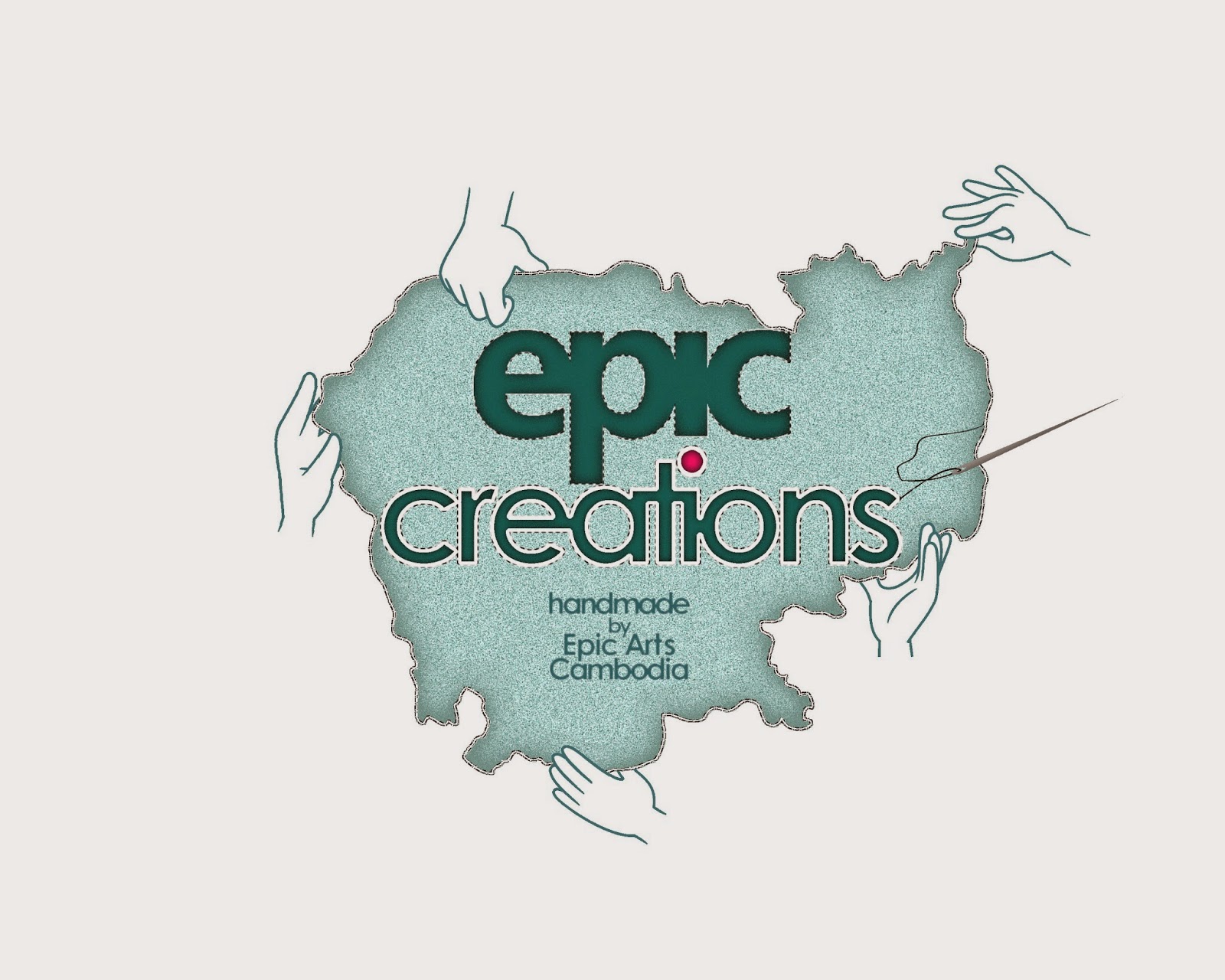In this blog post I want to tell you why I want to do this research project and also how I intend to carry out the project by outlining my Aims and Objectives.
The Why…...
During my time in Cambodia, I have found myself continually answering questions from visitors and participants such as, ‘What does Epic Arts actually do with the arts?’ and ‘What is inclusive arts?’ and at the same time hearing statements of ‘There is something different about the work Epic does.’ and ‘Every person really does count here.’ I feel the time has come to really identify what Epic Arts is doing that is unique at the end of a dusty track in the small town of Kampot. I strongly believe that what Epic Arts is doing and discovering is unique and it has a lot to share with other inclusive arts practitioners.
 |
| A student from the Inclusive Arts Course at Epic Arts Cambodia |
The Why…...
During my time in Cambodia, I have found myself continually answering questions from visitors and participants such as, ‘What does Epic Arts actually do with the arts?’ and ‘What is inclusive arts?’ and at the same time hearing statements of ‘There is something different about the work Epic does.’ and ‘Every person really does count here.’ I feel the time has come to really identify what Epic Arts is doing that is unique at the end of a dusty track in the small town of Kampot. I strongly believe that what Epic Arts is doing and discovering is unique and it has a lot to share with other inclusive arts practitioners.
Epic
Arts identifies itself as an ‘international, inclusive arts NGO’, and I believe
that a project that researches the perception, experience and practices of the
students, facilitators and programme managers at Epic Arts Cambodia, will
reveal a clearer identity and understanding of the work the organisation
carries out. I also feel that this research and the resulting information will
be invaluable to congruous organisations and practitioners in the UK as they work
with Epic Arts and discover and share what each partner organisation does
through presentations, discussions, workshops and performances. I believe that
all participating partners in this project will develop a clearer understanding
of inclusive arts and inclusive arts practices.
I
have been in conversation with Alice Fox, course leader for the MA Inclusive Arts Practice at the University of Brighton, who commented on the lack of
published research in to the area of inclusive arts. This has resulted in her being commissioned by
the Arts Council to edit a book about Inclusive Arts. I feel that this Masters level research project will add to the quantity of information available on the
subject of inclusive arts and will benefit and add to the current discourse in
this area. The UK Board of Trustees for Epic Arts also believe that now is the
time for Epic Arts to produce some academically sound research about what it is
doing and feels that this will develop the standing of Epic Arts within the
international arts scene.
 |
| An Inclusive Arts student paints the face of a community event participant at Epic Arts Cambodia |
The How……
What are my Aims?
- Explore the approaches to inclusive arts at Epic Arts Cambodia
- Present the results of this investigation in Cambodia publically to a world-wide audience
- Present the results of this investigation in Cambodia personally to congruous organisations in the UK
- Explore the approaches to inclusive arts at organisations congruous to Epic Arts in the UK
- Compare and reflect on the approaches to inclusive arts of Epic Arts and congruous organisations in the UK
- Report on the comparisons between approaches to inclusive arts at Epic Arts and at congruous organisations in the UK
What are my Objectives?
1.1 - Through a qualitative research
approach in the form of interviews, activity observations and facilitated
discussions, I will investigate
the perceptions, experiences and practices of activity participants,
facilitators and programme managers at Epic Arts Cambodia over an 8-month
period to tell the personal stories and uncover the real experiences of the
people at the organisation.
1.2 - I will investigate what necessary attitudes and subsequent practices are believed to bring about
successful inclusive art practice and what attitudes and subsequent
practices are believed to
hinder the practice.
 |
| An Inclusive Arts student from Epic Arts at a performance in Cambodia |
2.1 - I will publish an on-going public,
reflective blog that will collate, critically analyse and reflect on the
processes used, information collected and the learning that takes place through
the investigation.
2.2 - On the blog I will record and reflect on my personal learning journey
and the understanding that I gain from interactions with people at Epic Arts
with a focus on discovering what are the necessary attitudes and resulting
practices that people at Epic Arts believe bring about successful inclusive art
practice and what are attitudes can hinder the practice.
 |
| A student from the Special Education Project at Epic Arts watches a performance |
3.1 - The information collected in
Cambodia will form a presentation about Epic Arts that I will deliver to each
partner organisation in the UK during an Epic Arts UK-wide performance and
workshop tour in November 2014.
3.2 - The presentation will enable the personal
stories and experiences of inclusive arts participants, facilitators and programme managers in Cambodia to be shared in
order that practitioners in the UK can understand and learn about the ideas,
concepts, methods and personal attitudes that Epic Arts implements or promotes.
3.3 - The presentation will share the personal attitudes and the resulting
practices that project participants believe enable successful inclusive arts at
Epic Arts in Cambodia, alongside those attitudes that are believed to hinder
practice.
 |
| Students from the Inclusive Arts Course at Epic Arts performing in Cambodia |
4.1 - Through further qualitative research
in the form of interviews, activity observations, facilitated discussions and practical data collection
activities with
participants, facilitators and programme managers at the partner organisations
we visit in the UK, I will
discover what necessary attitudes and subsequent practices are believed to be
required to make inclusive arts successful within the UK and what attitudes
hinder inclusive arts practice in the UK.
4.2 - I will critically analyse the results of the UK based research to determine
the personal learning and the key discoveries that are made. The results of
this will be recorded on the public blog.
 |
| Local children watch an outside performance by Epic Encounters |
5.1 - On my return to
Cambodia in January 2015, I will begin to compare the similarities and
differences between information collected from Epic Arts Cambodia and congruous
organisations in the UK.
5.2 - On the public blog I
will record my learning journey through the analysis of the data collected in
both countries and I will discuss the differences and similarities in perceived
attitudes and subsequent
practices that can enable inclusive arts practice within both countries and
also those attitudes that can hinder practice.
5.3 - I will implement the process of critical reflection with all the
information gathered. From describing,
analysing and finally critically examining the combination of the descriptive
and analytical information I will discover new meanings and form clear ideas of
how all the information gathered can impact and inform future practise and
understanding
 |
| An audience member enjoys a recent parade by Epic Arts in Cambodia |
6.1 - In April 2015 I will publish a
written report and accompanying short film documenting the project and its
results. This report will be published in English, Khmer, a simple picture format and audio
formats to make it accessible to all participants. The report will be made available
to all participants and will be available to download on the Epic Arts website.
6.2 - I will share the report to all partners involved in the project and to key
organisations and policy makers in the UK and Cambodia. By making the report
public I hope that the research will influence the political debates and policy
surrounding disability arts, integrated arts and inclusive arts as a whole and
will also influence policy makers outlining inclusion and equality requirements
in areas such as education, the arts, health and business. Overall I hope that
this report and short film will not only make an impact on artists and arts mangers,
but on society as a whole by discussing the attitudes we must all cultivate in
order to create a truly inclusive society in which we can all live.
 |
| The Inclusive Arts students performing at a recent community event in Cambodia |
Thank you for reading this blog post. Please do add any comments or feedback to the blog or contact me at laura@epicarts.org.uk




















